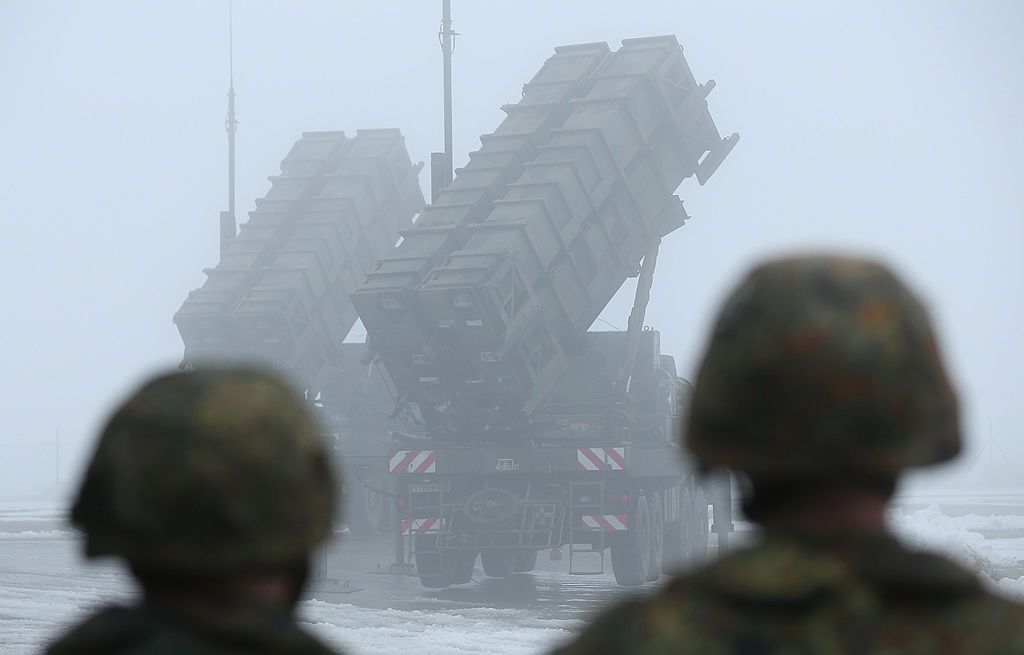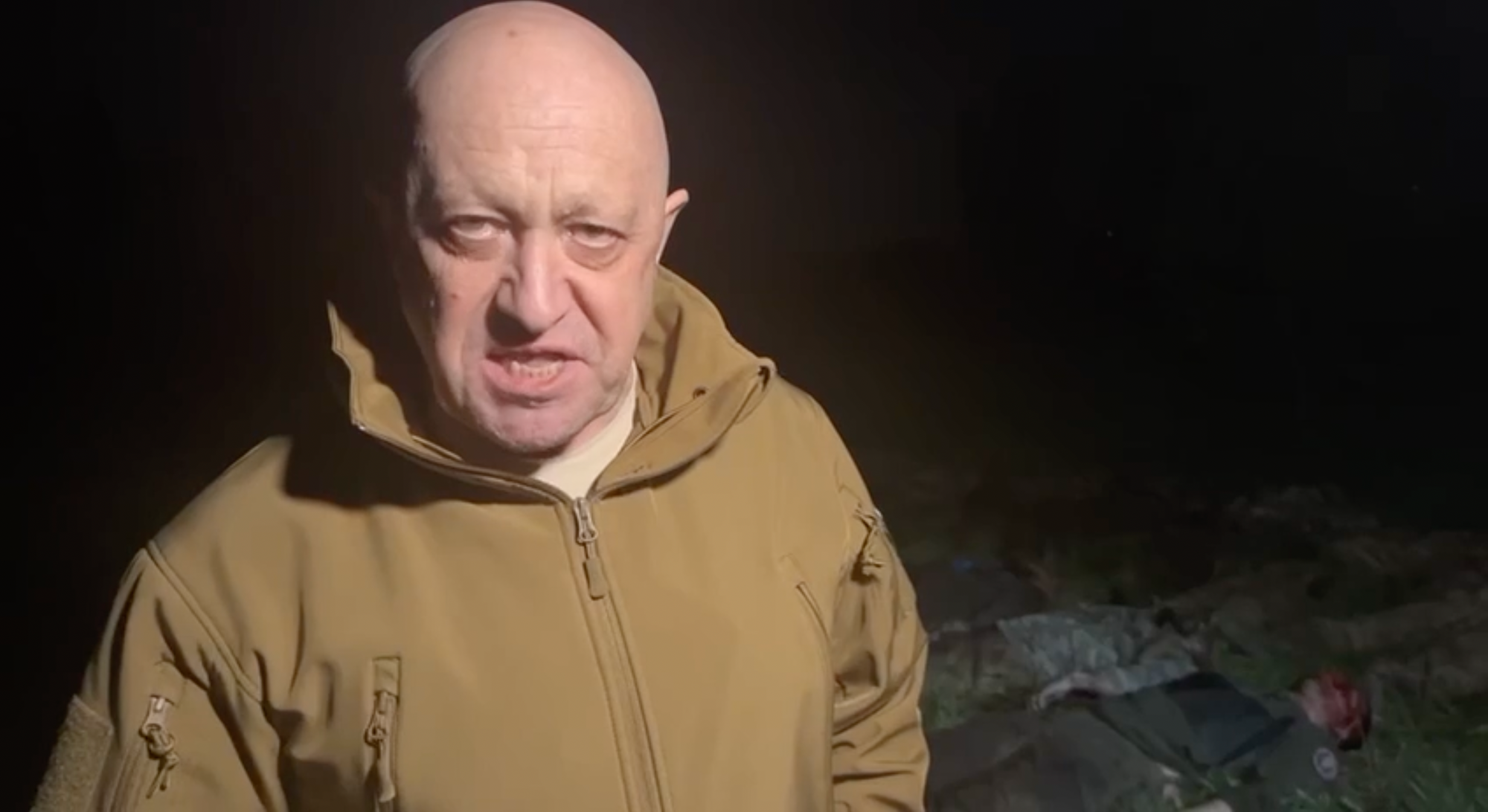Ukraine war latest: Wagner mercenaries again complain of ammunition shortage; Russia hits Ukraine with mass missile strike

Key developments on May 9:
- Ukraine intercepts most of Russian missiles in latest mass attack
- Putin reiterates anti-Western propaganda during Victory Day speech
- Wagner mercenaries again threaten to leave Bakhmut, saying they haven’t gotten ammunition despite requests
- Peace talks impossible now because “both parties are convinced they can win,” says UN chief
- US announces new $1.2 billion security package for Ukraine
- UK reportedly prepares to give long-range missiles to Ukraine
- UN updates its count of casualties in Ukraine
- EU chief visits Kyiv
Russian forces launched 25 Kalibr and Kh-101/Kh-555 cruise missiles and nine S-300 surface-to-air missiles at Ukraine overnight on May 9, injuring one civilian, the Ukrainian military reported.
The air defense downed 23 cruise missiles, according to Ukraine’s Air Force.
Missile debris damaged an apartment building in Dnipro, injuring a woman. She has been hospitalized, Dnipropetrovsk Oblast Governor Serhii Lysak reported on May 9.
An intercepted Russian missile has also damaged a household in Kyiv Oblast, according to the regional administration.
Two cruise missiles hit Ukraine's central Cherkasy Oblast, damaging an unidentified city-owned facility, Governor Ihor Taburets said. No casualties were reported.
In addition, Russian forces struck Kharkiv Oblast with at least six S-300 surface-to-air missiles, Governor Oleh Syniehubov reported. They damaged houses and roads, but no casualties were reported, according to the governor.
S-300 are Soviet missile systems designed for air defense. However, Russia has been using the repurposed S-300 to attack targets in Ukraine.
Due to its proximity to the Russian border, Kharkiv Oblast has been targeted by Russian attacks on a near daily basis since the beginning of the full-scale invasion in February 2022.
Russian forces also launched three S-300 missiles against Kramatorsk in Donetsk Oblast overnight, damaging civilian infrastructure, the military said.
On May 9, the United Nations human rights agency updated its count of casualties in Ukraine. According to it, Russia’s war has killed at least 8,791 civilians and wounded at least 14,815 in Ukraine from Feb. 24, 2022, to May 7.
The agency said that the actual number of casualties is likely much higher, as there is no access to the Russian-occupied territories or the places where the hostilities are ongoing.
UN Human Rights chief Volker Turk said on March 31 that the number of civilian casualties in Russia’s invasion of Ukraine far outstrips official figures. “These figures are just the tip of the iceberg,” Turk said.
Putin reiterates key propaganda claims at Victory Day celebrations
Russian dictator Vladimir Putin during his address at the annual Victory Day celebration in Moscow claimed “a real war has once again been unleashed against” Russia, calling it “a decisive turning point for civilization.”
On May 9, Russia celebrates the Nazi Germany’s defeat in World War II. For the second year, the celebrations take place amid Russia’s full-scale invasion of Ukraine.
In his address, the Russian dictator used the usual propaganda narratives to fuel war sentiments among Russians and justify the war Russia is waging against Ukraine.
He said that the Ukrainian people became so-called “hostages to a state coup,” referring to the 2013-2014 EuroMaidan revolution, the civilian protests across Ukraine against the pro-Russian regime of then-President Viktor Yanukovych.
Putin also lashed out against the West, claiming the “Western globalist elites” were spreading “Russophobia and aggressive nationalism,” aiming for Russia’s “disintegration and destruction.”
The leaders of Kazakhstan, Kyrgyzstan, Tajikistan, Uzbekistan, Turkmenistan, Belarus, and Armenia attended the celebration with Putin, marking the first time the Central Asian presidents met the Russian dictator after his indictment by the International Criminal Court.
The Institute for the Study of War said in its latest update on May 9 that Putin attempted to use the Victory Day parade to show Russia’s continued influence in Central Asia.
Russian authorities have canceled the traditional flyover at Moscow’s Red Square, as well as many celebrations across Russian and Russian-occupied territories, citing security concerns.
The main military parade in Moscow included fewer soldiers and less military hardware, compared to previous years, as the war against Ukraine has been taking a toll on the Russian army.
According to the General Staff of Ukraine’s Armed Forces, Russia has lost 195,620 troops, 3,734 tanks, 7,257 armored fighting vehicles, 308 airplanes, and 294 helicopters in Ukraine since the beginning of its full-scale invasion. These numbers can’t be independently confirmed.
Ukraine-Russia peace talks 'impossible' now, UN chief says
Peace talks between Kyiv and Moscow are currently impossible as “both parties are convinced they can win," UN Secretary-General António Guterres said in an interview to Spanish newspaper El País, published on May 9.
"This was a Russian invasion against international law, against the UN Charter, but I do not see Russia at the moment willing to withdraw from the territories it occupies, and I think Ukraine is hoping to retake them," said Guterres.
Leaked intelligence files suggest the U.S. believed the UN Secretary-General Guterres was "too accommodating" to Russia while trying to renew the Black Sea Grain Initiative, the BBC reported on April 13.
The UN and Turkey-brokered deal, first signed in July 2022, has allowed Ukraine to renew its grain exports after Russia blocked them in the first days of the full-scale invasion.
President Volodymyr Zelensky said in September last year Kyiv would have no negotiations with Russia until Putin’s regime changes. Zelensky presented his own “Peace Formula” two months later.
The 10-point peace plan, which Zelensky introduced at the G20 summit in November 2022, includes the immediate withdrawal of Russian troops from Ukrainian territory, the establishment of a Russian war crimes tribunal, the release of all prisoners and forcibly relocated people, and the prevention of ecocide.
Military aid
The U.S. Department of Defense announced on May 9 that it would provide an extra $1.2 billion security assistance package to Ukraine under the Ukraine Security Assistance Initiative (USAI).
The USAI is focused on "meeting Ukraine's most urgent requirements by committing critical near-term capabilities" as well as preparing the Ukrainian military with the capacity to "deter Russian aggression over the long term," the Pentagon said.
The security package includes additional air defense systems and munitions, 155 mm artillery shells, the equipment to integrate Western-provided air defense launchers, missiles and radars with Ukraine's air defense systems, ammunition for counter-unmanned air systems, commercial satellite imagery, and support for training, maintenance and sustainment activities.
The U.S. has provided $35.7 billion in security assistance to Ukraine since the start of the full-scale invasion, according to the U.S. State Department’s fact sheet published on May 3.
U.S. President Joe Biden has repeatedly pledged to stand with Ukraine for "as long as it takes."
European Commission President Ursula von der Leyen met with President Volodymyr Zelensky in Kyiv on May 9 to discuss the EU ammunition supply plan, an upcoming package of sanctions against Russia, and the bloc's ban on certain Ukrainian food exports.
They also discussed financial support for Kyiv and the country's progress on its path to EU membership, a day after Zelensky signed a decree on celebrating Europe Day in Ukraine.
The EU agreed to provide Ukraine with one million artillery rounds on March 20. The bloc dedicated one billion euros to reimburse member states that could send their shell arsenal right away. Another billion is reserved for the joint purchase of new rounds, and the final part of the program will be the production of the remaining artillery rounds.
Meanwhile, the U.K. is reportedly ready to send Ukraine long-range missiles that can hit targets up to 300 kilometers away.
The Washington Post reported on May 9, citing sources, that no final decision has been made.
The reports haven’t specified the details on the type and quantity of the missiles as well as delivery time.
Kyiv has long been asking its allies to have longer-range missiles, and now it appears that the notice from the U.K. is a noteworthy advancement towards providing Ukraine with such munitions.
In the notice posted on May 2, the U.K. Defense Ministry asked for "expressions of interest" in supplying such missiles, requesting a response within three days, according to the report.
The requested specifications match the U.K.-owned Storm Shadow cruise missiles that can be installed on Soviet-made Ukrainian jets.
Such missiles can reach Russia's territory, but Ukraine has repeatedly said it would not attack targets within Russia if the West provides Kyiv with long-range weapons.
Instead, Ukraine vowed to use such weaponry to attack Russian command centers, supply lines, ammunition, and fuel depots deep into Russian-occupied territories.
The U.K.’s Prime Minister Rishi Sunak announced on Feb. 8 that London would supply Ukraine with longer-range weapons. However, it was not clear what kind of missiles Sunak was referring to and when they would arrive.
The Battle of Bakhmut
Yevgeny Prigozhin, the boss of the Kremlin-controlled Wagner Group, reiterated that the Russian military commandment demands that his mercenaries stay in Bakhmut in Donetsk Oblast, where they have been fighting for almost a year, but still hasn’t been sending the ammunition the group requested.
“A combat order came yesterday which clearly stated that if we leave our positions it will be regarded as treason,” Prigozhin's press service said. “That was the message to us (from the commandment).”
“If there is no ammunition, then we will leave our positions and we will be asking who is really betraying the motherland. Apparently, the one (betraying Russia) is the person who signed (the order to supply too little ammunition),” the statement continued.
Prigozhin has repeatedly complained about ammunition shortages, blaming Russia's top military leadership and threatening to abandon positions in and around Bakhmut if Wagner mercenaries would be denied additional supplies.
“Ukrainians will come to you in Rostov if the front line collapses. (They) do everything for the front line to collapse,” Prigozhin said in a May 9 video, addressing an unnamed Russian general who allegedly pledged to supply Wagner mercenaries with the requested ammunition but hasn’t fulfilled the promise yet.
Russia’s Rostov-on-Don city that Prigozhin refers to in the video is headquarters to the Russian Southern Military District, led by Colonel General Sergey Kuzovlev.
However, Ukraine’s military dismissed Prigozhin’s claims of ammunition shortage as fake.
“Prigozhin has taken on military obligations and is unable to fulfill them – in particular, to capture Bakhmut,” Eastern Military Command spokesperson Serhii Cherevatyi said on May 8.
The Wagner mercenaries have served as the main attack force in Russia's attempts to seize Bakhmut and the entire Donetsk Oblast, more than half of which it currently occupies.
The Washington Post called Prigozhin’s threat to withdraw the mercenaries from Bakhmut a "last-ditch effort to cling to a prominent role in the invasion."
Bakhmut has been the epicenter of fighting between Ukrainian and Russian forces. The Wagner mercenaries have served as the primary shock troops in Russia's attempts to expand its control over Donetsk Oblast, more than half of which Russia currently occupies.
For the past year, Russian troops made only incremental gains in the Bakhmut sector, advancing only a few kilometers at the cost of thousands of killed and wounded in action.
Ukraine still holds western parts of the city.
The General Staff of Ukraine’s Armed Forces said in its evening update on May 9 that Bakhmut and Marinka continue to be experiencing the most severe fighting.
Lyman, Bakhmut, Avdiivka, and Marinka remain the primary targets of Russia's offensive in the region, where Ukraine’s forces repelled almost 30 Russian attacks on May 9, the military said.
Apart from Donetsk Oblast, Russian forces also attacked Sumy, Chernihiv, Luhansk, Kharkiv, Zaporizhzhia, Dnipropetrovsk, and Kherson oblasts on May 9 with artillery, mines, and missiles, according to the military.














